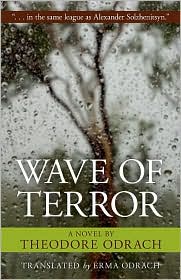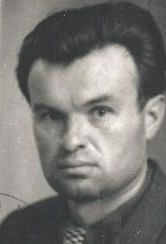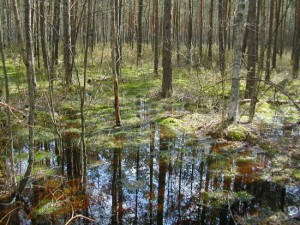“What happened today was a sign of things to come. The people in this small, out of the way place were falling victim to a huge, complex organism they could not even begin to understand.”
This sensi tive and memorable depiction of the establishment of Soviet Socialist Republics by Bolshevik revolutionaries in 1939, with its bloodshed and violence, is filled with incisive observations of real people behaving realistically during times of real crisis. In clear, unadorned prose, author Theodore Odrach depicts the lives of rural peasants with sensitivity and an awareness both of their independence and of their shared values, contrasting them with the mindless, bureaucratic officials who enjoy wielding power over human beings which have become mere ciphers to them. A sense of dark humor and irony, which may be the only thing that makes survival possible, distinguishes this novel from other novels of this period, and no reader will doubt that this book is written by a someone who has seen the atrocities unfold, experienced the injustices, empathized with his fellow citizens, and felt compelled to tell the world about the abuses.
tive and memorable depiction of the establishment of Soviet Socialist Republics by Bolshevik revolutionaries in 1939, with its bloodshed and violence, is filled with incisive observations of real people behaving realistically during times of real crisis. In clear, unadorned prose, author Theodore Odrach depicts the lives of rural peasants with sensitivity and an awareness both of their independence and of their shared values, contrasting them with the mindless, bureaucratic officials who enjoy wielding power over human beings which have become mere ciphers to them. A sense of dark humor and irony, which may be the only thing that makes survival possible, distinguishes this novel from other novels of this period, and no reader will doubt that this book is written by a someone who has seen the atrocities unfold, experienced the injustices, empathized with his fellow citizens, and felt compelled to tell the world about the abuses.
Odrach sets his story in Hlaby, in the Pinsk Marshes, an enormous marshland which extends into Poland, Belarus, and the Ukraine, a place which is so remote that it cannot be reached except in the winter when the marsh is frozen. Its people are subsistence farmers who have grown up speaking, first, Polish, and later Ukrainian. When the Bolsheviks arrive in 1939, however, they announce that henceforth this village will be part of the Belarus Soviet Socialist Republic. All their schools will be taught in Belarussian, and all their business dealings will be in Belarussian, despite the fact that no one in the area speaks that language, knows it, or can teach it. The penalties for non-compliance are extreme and trigger some of the novel’s many horrors. The largest farm in the area is collectivized, its owner beaten to death. The innocent people employed on that farm are under suspicion of subversion. All churches and temples are outlawed. The former headmaster of the school has been killed while trying to escape the Bolsheviks, and the new headmaster, the intelligent and sympathetic Ivan Kulik, is hard pressed to remain silent as he sees innocent people taken from the village to the nearest rail line and put into boxcars for Siberia–if they are lucky.
teach it. The penalties for non-compliance are extreme and trigger some of the novel’s many horrors. The largest farm in the area is collectivized, its owner beaten to death. The innocent people employed on that farm are under suspicion of subversion. All churches and temples are outlawed. The former headmaster of the school has been killed while trying to escape the Bolsheviks, and the new headmaster, the intelligent and sympathetic Ivan Kulik, is hard pressed to remain silent as he sees innocent people taken from the village to the nearest rail line and put into boxcars for Siberia–if they are lucky.
The government officials here are characterized by their mindless adherence to regulations and quotas, which make no sense for this village, and Odrach must walk a fine line as he creates dark humor at their expense while never underestimating their very real power. His sense of what makes these sadistic officials “tick” makes them as frighteningly real for the reader as they must have been for the peasants. Still everyone tries to lead a “normal” life, and this small village becomes the world “writ small.” An argument between the Ukrainian parents of Marusia, a beautiful girl to whom Kulik is attracted, is full of hilarious insults, a scene worthy of the best farces. Marusia, who has Russian pretensions, actually “envied her friends whose parents were able to maintain well balanced arguments in Russian without using the slightest Ukrainian word.”
 Details such as this emphasize Odrach’s instinctive recognition of key details, which allows him to tell stories within stories with a straightforward simplicity which makes the novel come alive. As the winter turns into spring, the well developed characters search for love, go to a New Year’s Eve dance, travel to conferences, attend a general meeting (where they show their displeasure by electing three outcasts to the Praesidium), and deal with rebellious second-graders, always, however, on the lookout for informers and always unable to share their feelings about the revolution. Several are arrested, interrogated, and released, raising suspicions that dossiers are being prepared for their expulsion from the community, if not their deaths. As the novel comes to a close, the reader is reminded again of Theodore Odrach’s own life (described in the Introduction by T. F. Rigelhof), and one can only wonder if the novel’s moving conclusion is truth, not fiction.
Details such as this emphasize Odrach’s instinctive recognition of key details, which allows him to tell stories within stories with a straightforward simplicity which makes the novel come alive. As the winter turns into spring, the well developed characters search for love, go to a New Year’s Eve dance, travel to conferences, attend a general meeting (where they show their displeasure by electing three outcasts to the Praesidium), and deal with rebellious second-graders, always, however, on the lookout for informers and always unable to share their feelings about the revolution. Several are arrested, interrogated, and released, raising suspicions that dossiers are being prepared for their expulsion from the community, if not their deaths. As the novel comes to a close, the reader is reminded again of Theodore Odrach’s own life (described in the Introduction by T. F. Rigelhof), and one can only wonder if the novel’s moving conclusion is truth, not fiction.
The author, an enormously gifted writer who arrived in Canada in 1953, lived in obscurity there until his death in 1964, at the age of fifty-three. In an article entitled “Unsung Writer, Unknown Identity,” Michael Posner, in the Toronto Globe and Mail, tells the story of “Theodore Odrach” and of his daughter Erma, who has become the translator of his novels and short stories, a project on which she has worked for twenty years and which is now beginning to bear fruit. A number of her father’s short stories have been published to great acclaim in serious literary journals during that time, and this novel has now been published for the first time in English. Erma Odrach herself is only beginning to discover who her father really was, however. His life after his escape from the Soviet Union appears to have been devoted to becoming as anonymous  as possible in Toronto, thereby protecting his young family there, as well as any surviving family in the Ukraine. Now, with the publication of this remarkable novel, the world may finally discover a writer whose war-time observations have been compared with those of Alexander Solzhenitsyn and whose dark humor has been compared to that of Anton Chekhov.
as possible in Toronto, thereby protecting his young family there, as well as any surviving family in the Ukraine. Now, with the publication of this remarkable novel, the world may finally discover a writer whose war-time observations have been compared with those of Alexander Solzhenitsyn and whose dark humor has been compared to that of Anton Chekhov.
Photos, in order: The author’s website, established by his daughter/translator, is the source of the author’s photo: http://www.theodoreodrach.com.
The fascinating story of Erma Odrach’s trip to the Ukraine and her discoveries about her father’s identity and his family is here: http://www.theodoreodrach.com
Erma Odrach’s photo is from her Goodreads page.
The photo of the Pinsk Marshes comes from http://www.ramsar.org
